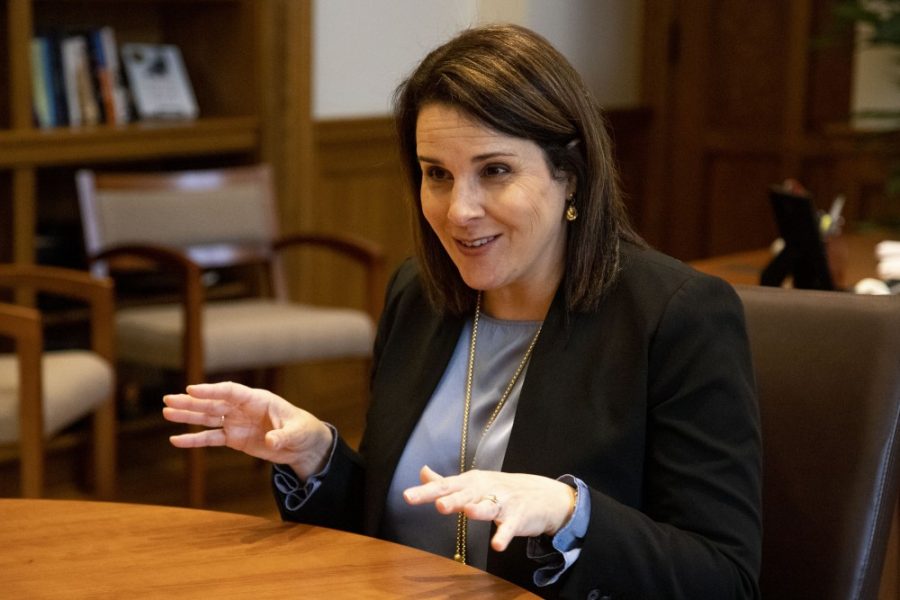The University of Minnesota Board of Regents approved a new employment contract and a significant pay increase for President Joan Gabel Friday, which has been met with growing disapproval from staff and faculty.
Faculty from the University’s chapter of the American Association of University Professors (AAUP) criticized Gabel’s salary increase largely because other employees have not been fairly compensated for their work during the pandemic, and to keep up with rising costs of living.
Gabel could earn over $1.1 million with salary increases, bonuses and supplementary retirement funds by the end of her employment in 2026 with the new contract. This would make Gabel the first University president to earn $1 million, according to the AAUP press release on Thursday.
The board raised Gabel’s salary to place her earnings at the average of president salaries at other Big Ten institutions, according to the Friday meeting docket. The docket said faculty at the Twin Cities campus are on average paid 5% less than faculty at most comparable institutions.
“Knowing that our salaries are about 5% lower than our peer institutions … it is really hard to see somebody who’s already incredibly well paid getting this astonishingly big bump,” anthropology professor Karen-Sue Taussig said.
Faculty receive salary increases in a few scenarios — including in the case of promotions and raises taken from an annual merit pool.
“For faculty, we get no cost of living increases,” Taussig said.
“There’s no reason that our president shouldn’t be paid at the midpoint of our peer institutions,” Taussig said. “But, then the faculty and staff should be similarly recognized and rewarded.”
Faculty have put in labor throughout the pandemic to ensure students received high-quality education, such as learning new technologies and navigating online classes, Taussig said.
She said staff also contributed significant effort to ensure the safety and health of students on campus. Janitorial staff cleaned and sanitized spaces on campus more often and facilities management analyzed air ventilation and quality.
All of these employees should be recognized and rewarded for their efforts along with Gabel, Taussig said.
Unionized University staff are set to receive a 1.5% salary increase, while national inflation rates increase and many are facing unexpected expenses from the COVID-19 pandemic, said political science professor Nancy Luxon in an email to the Minnesota Daily.
Prices in the Twin Cities area are currently up 6.9% from a year ago, according to the U.S. Bureau of Labor Statistics.
“Staff in particular worked tirelessly to keep the gears of the U turning these last two years,” Luxon said. “Now so many are retiring early or seeking other work because they are overworked and underpaid.”
Clerical workers who will receive the 1.5% increase earn, on average, about $45,000, according to the AAUP release. With a 1.5% increase, those workers’ earnings would increase to about $45,675, which is below Hennepin County’s living wage for a family of three.
The current living wage for a family with two working adults and one child in Hennepin County is roughly $78,000.
The University’s model for awarding faculty salary increases does not align with the cost of living, according to Taussig.
For faculty salary increases, the University gives departments a monetary figure that indicates the amount of money available for merit salary increases each year. Each department receives a percentage of the total sum of salaries in the department that must be distributed among faculty according to merit, so it cannot be equally distributed, Taussig said.
For example, if the University decides on a merit pool increase of 2%, each department receives 2% of the sum of all of the salaries in the department. This extra money is then distributed among faculty according to merit and performance for that year. This means some faculty could receive a 1% increase while others could receive a 4% increase.
The minimum salary for full-time professors, associate professors and assistant professors is currently $46,116 a year. If a professor making the minimum salary receives a 2% increase one year, their salary would increase to about $47,038.
According to the AAUP release, decreases in the annual merit pool will not impact Gabel’s salary. For example, if the board approves a merit pool increase of 4% in one year, then Gabel’s annual raise would increase from 3% to 4%. However, if the merit pool is 2%, Gabel would still receive a 3% raise.
The University typically awards merit bonuses between 0 and 2%. In the past 20 years that Taussig worked at the University, she said the merit pool has rarely been above 2%.
Across the last five years, the University’s cumulative merit pool has on average been 2.06% lower than merit increases for national education, 3.63% lower than Minneapolis and St. Paul and 3.71% lower than all industries combined.
The board is currently considering a 3% merit pool for the upcoming fiscal year. While this increase is not insignificant, Taussig said, it does not fully compensate for the salary cuts and additional labor undertaken by faculty during the 2020-21 fiscal year.
“I personally don’t mind if the Regents want to support this [new contract] as long as they have a plan to recognize all of the other effort [by staff and faculty],” Taussig said. “And to not just recognize it, but to reward it”




























UMN0001
Dec 21, 2021 at 11:53 pm
I am sure most faculty had no problem “learning new technologies”… However Karen’s classes pre-pandemic did not use any technology. She was so out of touch with the real world….Makes sense why she is an anthropology professor stuck in the 1950s.
Rob Reynolds
Dec 20, 2021 at 2:17 pm
You have to be kidding!!! Teachers and staff are upset? Teachers got to sit in the house on zoom and give an inferior product, while students sat in a dorm room, stuck to zoom with curfews and raised tuition!
I don’t think she deserves a raise either considering the campus is as unsafe as it ever has been with no plans to protect these kids!!!